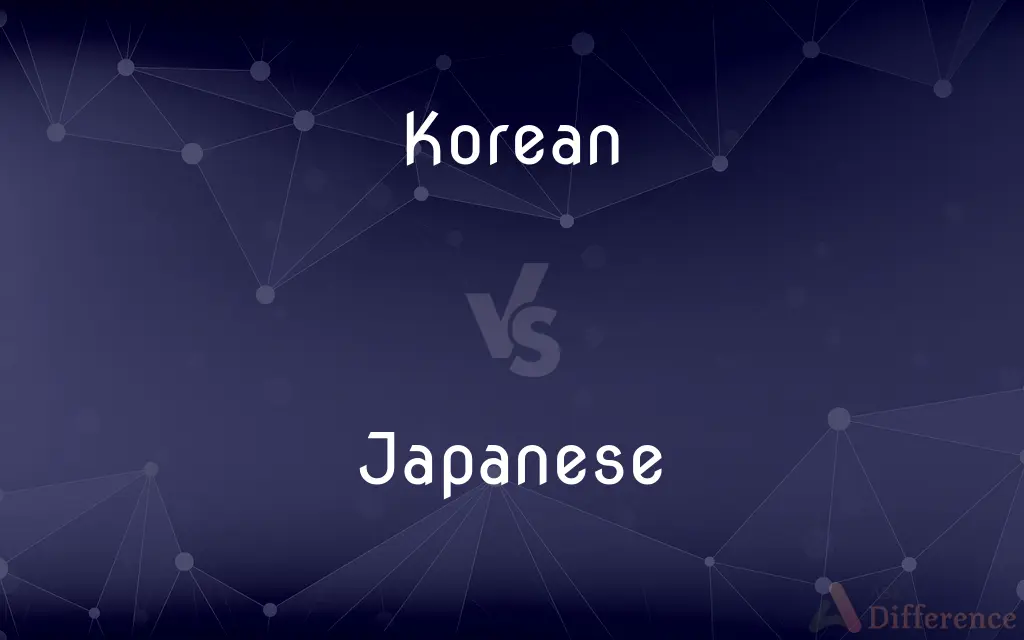Korean vs. Japanese — What's the Difference?
By Tayyaba Rehman — Updated on September 22, 2023
Korean and Japanese are languages and cultures originating from South Korea and Japan, respectively. While both are East Asian, they differ significantly in language structure, writing systems, cuisine, and historical influences.

Difference Between Korean and Japanese
Table of Contents
ADVERTISEMENT
Key Differences
Korean refers to the language and culture originating from the Korean Peninsula, most notably South Korea. Japanese refers to the language and culture of Japan. Both cultures are part of East Asia but have distinct languages, alphabets, and grammatical structures. While Korean uses Hangul as its writing system, Japanese employs Kanji, Hiragana, and Katakana.
Korean cuisine is known for its use of garlic, sesame oil, and fermented vegetables like kimchi. Japanese cuisine, on the other hand, places a heavy emphasis on rice, fish, and vegetables, with popular dishes like sushi and sashimi. Korean meals often come with multiple side dishes, while Japanese meals are often more minimalistic and aesthetic in presentation.
Korean history has been significantly influenced by China and Mongol invasions, with Confucianism playing a large role in cultural values. Japanese history includes periods of isolationism, with a more indigenous set of beliefs including Shinto and later influences from Buddhism. Both countries have been impacted by Westernization but in different ways and to varying degrees.
Korean language employs subject-object-verb (SOV) sentence structures and has various levels of formality in speech. Japanese also has multiple levels of politeness but uses a different set of honorifics and sentence structures. While both languages have loanwords from English and other languages, the core vocabulary and phonetics are quite different.
Comparison Chart
Origin
Korean Peninsula
Japan
ADVERTISEMENT
Writing System
Hangul
Kanji, Hiragana, Katakana
Cuisine
Kimchi, BBQ
Sushi, Sashimi
Language Structure
Subject-Object-Verb
Subject-Object-Verb or Subject-Verb
Historical Influences
China, Mongol
Indigenous, China
Compare with Definitions
Korean
Korean is the official language of South Korea.
She speaks Korean fluently.
Japanese
Japanese is the official language of Japan.
He is studying Japanese in college.
Korean
Korean cuisine includes dishes like kimchi and bulgogi.
Korean BBQ is very popular these days.
Japanese
Japanese cuisine includes dishes like sushi and ramen.
Japanese sushi is world-renowned for its quality.
Korean
Korean culture has a strong influence from Confucianism.
The Korean education system emphasizes respect for elders.
Japanese
Japanese culture incorporates elements of Shinto and Buddhism.
Japanese temples are often associated with Buddhist practices.
Korean
Korean pop culture includes K-pop and Korean dramas.
The global influence of Korean pop culture is increasing.
Japanese
Japanese writing uses Kanji, Hiragana, and Katakana.
Japanese Kanji characters can have multiple meanings.
Korean
A native or inhabitant of Korea.
Japanese
Japanese pop culture includes anime and manga.
Japanese anime has a large international following.
Korean
A person of Korean ancestry.
Japanese
Relating to Japan or its language, culture, or people.
Korean
The language of the Koreans, possibly in the Altaic family.
Japanese
A native or inhabitant of Japan, or a person of Japanese descent.
Korean
Of or relating to Korea or its people, language, or culture.
Japanese
The language of Japan, spoken by almost all of its population.
Korean
Of or pertaining to Korea; as, Korean handicrafts; the Korean war.
Japanese
Of or relating to Japan or its people, language, or culture.
Korean
A native or inhabitant of Korea who speaks the Korean language
Japanese
A native or inhabitant of Japan.
Korean
The Altaic language spoken by the Korean people
Japanese
A person of Japanese ancestry.
Korean
Of or relating to or characteristic of Korea or its people or language;
Korean handicrafts
Japanese
The Japonic language of the Japanese, written in kana and Chinese characters.
Korean
Korean writing uses a system called Hangul.
Learning Hangul is the first step in studying Korean.
Japanese
Of or pertaining to Japan, or its inhabitants.
Japanese
A native or inhabitant of Japan; collectively, the people of Japan.
Japanese
The language of the people of Japan, called in the Japanese language nihongo.
Japanese
A native or inhabitant of Japan
Japanese
The language (usually considered to be Altaic) spoken by the Japanese people
Japanese
Of or relating to or characteristic of Japan or its people or their culture or language;
The Japanese Emperoro
Japanese cars
Common Curiosities
What is Japanese?
Japanese refers to the language and culture from Japan.
How is Japanese culture influenced?
It has influences from Shinto, Buddhism, and a period of isolationism.
How is Korean culture influenced?
It is influenced by Confucianism and historical ties to China.
Do Korean and Japanese use the same alphabet?
No, Korean uses Hangul, and Japanese uses Kanji, Hiragana, and Katakana.
What is a notable dish in Japanese cuisine?
Sushi is a well-known Japanese dish.
Are Korean and Japanese languages similar?
They are distinct languages with different grammar and vocabulary.
What is Korean?
Korean refers to the language and culture from the Korean Peninsula.
What is a notable dish in Korean cuisine?
Kimchi is a well-known Korean dish.
Are Korean and Japanese histories similar?
Both have unique histories with different influences and events.
Do Korean and Japanese share similar festivals?
Both have unique traditional festivals and holidays.
Is K-pop popular in Japan?
Yes, K-pop has gained popularity in Japan.
Is Korean or Japanese easier to learn?
Both have their complexities, and ease of learning can be subjective.
Is anime popular in Korea?
Yes, Japanese anime has a following in Korea.
What’s the Japanese currency?
The currency in Japan is the Japanese Yen.
What’s the Korean currency?
The currency in South Korea is the Korean Won.
Share Your Discovery

Previous Comparison
View vs. Sight
Next Comparison
Shanghai vs. BeijingAuthor Spotlight
Written by
Tayyaba RehmanTayyaba Rehman is a distinguished writer, currently serving as a primary contributor to askdifference.com. As a researcher in semantics and etymology, Tayyaba's passion for the complexity of languages and their distinctions has found a perfect home on the platform. Tayyaba delves into the intricacies of language, distinguishing between commonly confused words and phrases, thereby providing clarity for readers worldwide.














































